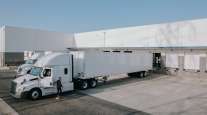Uber Freight Eyes Tenfold Boost in European Market by 2028

[Stay on top of transportation news: Get TTNews in your inbox.]
Uber Freight is stepping up efforts to expand in Europe’s fragmented logistics market and aims to increase tenfold to 2 billion euros its freight under management by 2028, with a digital platform that manages companies’ entire supply chains.
The freight business of Uber Technologies Inc. is smaller than the ride-hailing and delivery divisions, accounting for 14% of total revenue in 2023. While those other two units grew last year, freight revenue was down almost 25% from a year earlier, according to a recent SEC filing.
That slump is mostly blamed on weak trucking rates, but there are recent signs of a turnaround as supply chain snarls ease and bloated inventories deflate. Lior Ron, the founder and CEO of Uber Freight, said success with large companies in North America is among the biggest reasons for the digital push on the other side of the Atlantic.
“We have the Uber infrastructure in Europe we can build on from a technology perspective and a brand perspective, and on the other end we have U.S. customers, global customers asking us to help,” Ron said in an interview. “We are very motivated to invest in Europe.”

Ron
Ron was speaking ahead of Uber Freight’s announcement March 12 that it has reached 200 million euros ($218 million) in freight under management in Europe as it competes for a bigger slice of a logistics market that McKinsey & Co. estimates to be worth 1.2 trillion euros.
Uber Freight uses some of the same visibility technology as popular ride-hailing and delivery services do, but it’s not simply creating an app in Europe where independent truckers are matched with shippers needing deliveries.
Ron described the model as part of an industry category called fourth-party logistics, or 4PL, which involves taking over a company’s entire supply chain management with the aim of boosting visibility, reducing costs and harnessing data.
Uber Freight’s path in Europe has been a winding one. It started in 2019 as a digital freight brokerage with operations initially in the Netherlands, Germany and Poland.
During the pandemic, the European freight brokerage business was sold to Berlin-based Sennder Technologies and the focus shifted to core operations. Uber Freight’s purchase of Transplace in 2021 allowed it to re-enter Europe as a managed transportation provider using software rather than be a freight broker that provides capacity.
Florian Neuhaus, a logistics expert and partner with McKinsey in Vienna, said there’s an opportunity in Europe’s logistics industry to standardize operating platforms for shippers.
Want more news? Listen to today's daily briefing above or go here for more info
“When you look at most of the large companies and brokers offering road logistics specifically, they’re all developing their own transport management systems,” he said. “There are offerings out there on the TMS side for shippers, but these are often either linked to the large enterprise software providers or are relatively small offerings — so there’s no absolute standard.”
For companies, Ron said Uber Freight can be the “control tower for the entire supply chain” — managing orders, planning procurement and dealing with transport partners. It’ll help with transparency in the process, especially in Europe where carbon footprints from shipping is a higher priority to track.
“In the U.S., sustainability and CO2 emissions in your supply chain are a nice to have. In Europe, it’s a must,” Ron said. “This is something that management teams are being measured on, stakeholders and investors are expecting, and consumers are holding those companies accountable for much more than in the U.S.”




